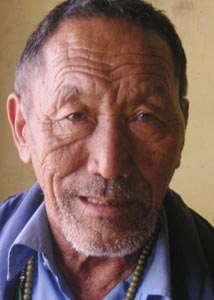Name: Dhondup
(Alias: Yes)
Gender: Male
Interview Age: 69
Date of Birth: 1938
Birthplace: Dik, Utsang, Tibet
Year Left Tibet: 1959
Profession: Agriculture, Dairy Farming
Monk/Nun: No
Political Prisoner: Yes

Interview No.: 62
Date: 2007-07-03
Language: Tibetan
Location: Lugsung Samdupling Settlement, Bylakuppe, Karnataka, India
Categories: Culture and History
Keywords: Chinese -- first appearance of, Chinese rule -- life under, customs/traditions, environment/wildlife, escape experiences, farm life, government/administration, nomadic life, taxes, Utsang
Summary:
Dhondup fondly recalls the beautiful landscape of his childhood village, Dik, nestled among the snow-capped mountains of Tibet's Re District. He describes a special type of grass on the plains called jaktsa and the life of his pastoral Tibetan farming family. Dhondup explains Tibetan farming policy, which distinguished between telpa 'farmers who paid taxes' and dhuechung 'farmers who did not.' He also describes the custom of telpa families sending one of their sons to become a monk at the local monastery. Dhondup explains the relationship of labor and payment between the poor and wealthy families and the legal system available to address disputes.
Since Dhondup's village was located in a remote place near the mountain pass to India, he and other villagers escaped soon after His Holiness the Dalai Lama fled to India in order to avoid the horror of the thamzing 'struggle sessions' the Chinese inflicted on Tibetans in other locations.
Dhondup holds some Tibetan officials responsible for the sufferings of his people, explaining how the Chinese bribed them with dhayen 'silver coins.' Dhondup also expresses his view that the farmers were not interested in the "liberation" that the Chinese claimed to bring to Tibet.
Interview Team:
- Rebecca Novick (Interviewer)
- Ronny Novick (Videographer)
- Tsering Dorjee (Interpreter)

